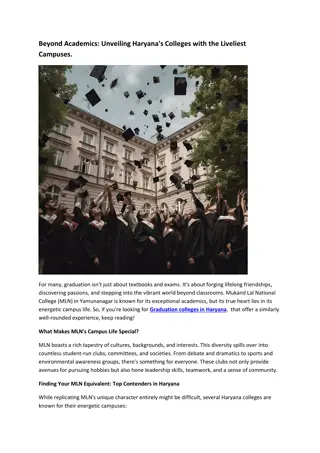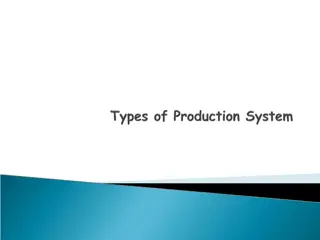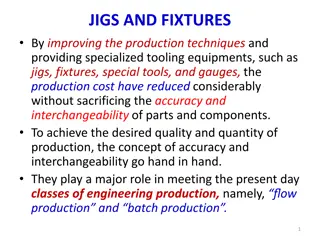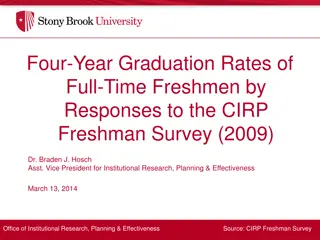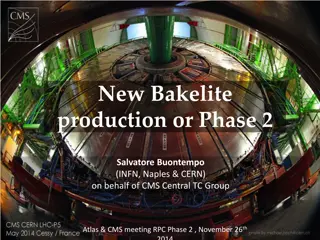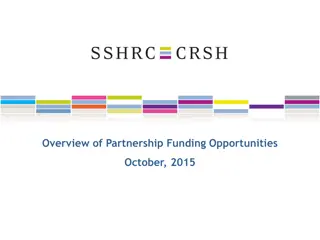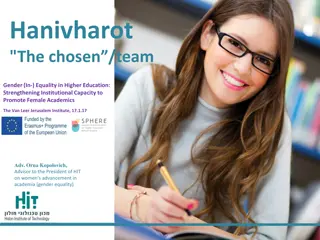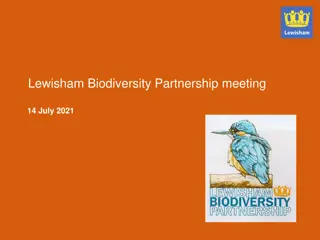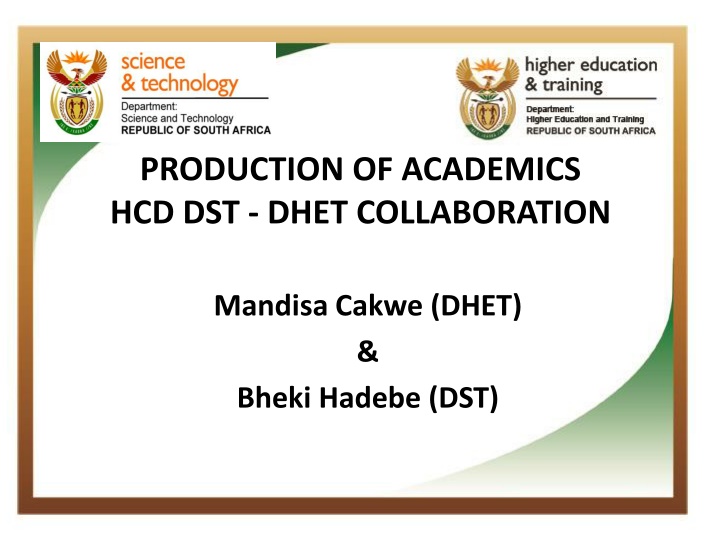
Academics Production Collaboration for National Development Plan 2030
Explore the collaboration between HCD, DST, and DHET to enhance academic production, aligning with South Africa's National Development Plan 2030. The plan aims to increase participation and throughput rates in higher education, fund NSFAS recipients fully, boost science graduates, and elevate the percentage of PhD-qualified academic staff. Emphasis on innovation, expanding R&D, and fostering collaboration across sectors to establish South Africa as a regional hub for higher education and training.
Download Presentation

Please find below an Image/Link to download the presentation.
The content on the website is provided AS IS for your information and personal use only. It may not be sold, licensed, or shared on other websites without obtaining consent from the author. If you encounter any issues during the download, it is possible that the publisher has removed the file from their server.
You are allowed to download the files provided on this website for personal or commercial use, subject to the condition that they are used lawfully. All files are the property of their respective owners.
The content on the website is provided AS IS for your information and personal use only. It may not be sold, licensed, or shared on other websites without obtaining consent from the author.
E N D
Presentation Transcript
PRODUCTION OF ACADEMICS HCD DST - DHET COLLABORATION Mandisa Cakwe (DHET) & Bheki Hadebe (DST)
A. National Development Plan 2030 Increase participation rate to 25% (from 950 000 in 2010 to 1 620 000 in 2030); Increase throughput to 75% (167 000 to 425 000); Full funding for all NSFAS recipients; Double science graduates, increase African & women postgrads; Increase masters & PhD students to 25%; Produce 100 PhDs/million of population/annum i.e. 5000 p a by 2030 Increase % of PhD qualified academic staff to 75% in 2030 (39% in 2013) black and women making more than 50% of teaching & research staff 2
A. National Development Plan 2030 The NDP (by 2030) Innovation is critical to solving South Africa s pressing challenges, introducing new products into the market and producing goods and services more efficiently. R&D should be significantly expanded. Critically, the pool of researchers needs to expand and their productivity needs to increase significantly. Collaboration across the sectors of the South African education system and with foreign universities and firms should lead to higher levels of innovation. Establish SA as a hub for HE & training in the region, capable of attracting a significant share of international student population; &
B. Institutional Landscape DBE: responsible for basic education (over R205 billion including provinces; 26,000 schools, about 12 m learners); DHET: responsible for higher education (universities and technical and vocational education - over R30 billion for universities; 26 universities; about 1 m students (population 51 m); +-13% P/G, +- 18 000 research and academic staff; DST: responsible for R & D & Innovation across the national system of innovation (R7.4 billion; 15,000 Postgraduate students); 5 universities accounted for 60% of all research publications from the university sector; Non-SA PhD postgraduate enrolment at about 25%; & GERD as percentage of GDP less than 1%.
Key results: Retention and conversion of students (1/7) C. New Generation Researchers Joint Study Projects Retention and Conversion Study 5 years after first registration, 29% of Bachelors graduates progressed to a Honours (less than a third) 5 years after first registration, 27% of Hons graduates progressed to a Master s (just above a quarter) 5 years after first registration, 15% of Masters graduates progressed to a PhD Doctoral Training in Engineering currently commissioned to ASSAf 5
C. New Generation Researchers Doctoral Enrolments vs Graduates, 2000 - 2013 20000 18000 16000 14000 12000 10000 8000 6000 4000 2000 0 2008 2000 2001 2002 2003 2004 2005 Enrol. 2006 2007 2009 2010 2011 2012 2013 Grad. 6
C. New Generation Researchers NRF Support as a % of total (DHET contributed 464 m during this period supporting close to 2 000 postgrads through the Skills Development Fund) Performance: NRF support as percentage of total (3/5) 2009 2010 2011 2012 2013 2014 Targets 3.2 4.7 2.9 5.1 5.1 5 Honours 5.4 7.6 7.3 6.9 7.1 10 Masters 13.1 16.2 15.4 14.5 14.1 18 Doctoral 5.0 7.1 5.9 6.9 7.0 11 Average 5,453 8,221 7,266 8379 9,118 10,750 Number of Students 189 329 215 363 459 Cost (Rm) 7
D. Emerging Researchers Programmes SSAUF Programme a national and sector response towards addressing challenges in relation to size, composition & capacity of SA s academic staff. builds on & takes forward work that was carried out by a HESA task team, which culminated in a report, Proposal for a National Programme to Develop the Next Generation of Academics for South African Higher Education (HESA, 2011). takes as its starting point the urgent imperative to recruit, support and retain black academic staff to address their very serious under-representation at all levels in the sector . 80% of the prospective academics must be black South Africans/women. 8
STAFFING SOUTH AFRICAS UNIVERSITIES FRAMEWORK (SSAUF) Existing Academics Capacity Enhancement Programme Nurturing Emerging Scholars Programme New Generation of Academics Programme University Capacity Development Programme Senior Undergrad. & Honours students Senior Prof., Admin., Man. & Support Staff New young academics Current Academics Will enable universities to recruit, in a temporary capacity, people with specific skills to support the implementation of other SSAUF programmes, for example retired academics, experts in industry, professionals and contracted academics from other countries Supplementary Staff Programme SSAUF Development Programme Cuts across the core programmes and supports teaching and research development needs in each programme.
D. Emerging Researchers Programmes nGAP Scholar posts 125 nGAP lecturing posts have been allocated to universities for 2015/16 financial year; Number of allocated posts varies by institution from year to year (from 2 up to 8 posts per institution); These are 6-year commitments by the DHET with the first 3 years fully funded by the DHET and thereafter on a sliding scale of joint contribution by DHET & the University; and Government funding will cover:- full costs for the first 3 years of the SSAU Development Programme 75% of the costs of the fourth year 50% of the costs of the 5th , and 25% of the costs of the 6thyear 10
D. Emerging Researchers Programmes Funding R271 855 875m has been allocated to universities for nGAP appointees These funds are meant to cover the following: Remuneration as a lecturer (permanent from onset) Master s / Phd studies Mentoring; and Teaching and Research Development. 11
D. Emerging Researchers Programmes nGAP DST-NRF Support The DST-NRF Research Development Grants for nGAP Scholars will provide funding for two years to cover the following costs: Proposal development; Research running expenses; and Small research equipment. The DST-NRF will put in place a nGAP funding track within the Thuthuka programme (Thuthuka a programme targetting black and women emerging researchers
D. Emerging Researchers Programmes Silent Majority Study Challenges with supporting black and women researchers: HEMIS data - about 12 000 black and women researchers at lecturer and senior lecturer (proxy for emerging researchers) at universities, About 1 000 emerging researchers apply for emerging researchers funding under the Thuthuka programme, about three-quarters (750) funded. Of the funded, about 33% (240) are women, This critical pool of women and black researchers who are not active in applying for research funding has been identified as the Silent Majority .
E. Established Researchers Programmes DST-NRF established 198 research chairs under SARChI DHET to fully fund 6 research chairs DHET established NIHSS
Conclusion Quoting from the Honourable Minister of Finance s budget vote speech, ..the action we require involves collective action by many stakeholders.




